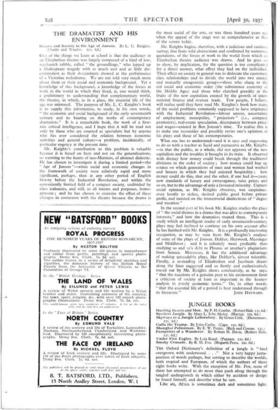THE DRAMATIST AND HIS ENVIRONMENT
ONE of the things we learn at school is that the audience in an Elizabethan theatre was largely composed of a kind of low, mechanick rabble, called " the groundhogs," who lapped up a Shakespeare tragedy with as much zest and as little dis- crimination as their descendanti ,showed at the performance of a Victorian melodrama. We 'are not told very much more about them or their social and economic background. Yet a knowledge of this background, a knowledge of the forces at work in the world in which they lived, is, one would think, a preliminary to understanding that complementary world, the theatre, in which, as in a glass, the essential life of the age was mirrored. The purpose of Mr. L. C. Knights's book is to supply this information, to study, in his own words, " the economic and social background of the early seventeenth century and its bearing on the works of contemporary dramatists." It is a remarkable book, the work of a first- rate critical intelligence, and I hope that it will be read not only by those who are counted as specialists but by anyone who has ever considered the relation between economic activities and general culture—a problem, incidentally, of particular cogency at the present time.
Mr. Knights's contribution to this problem is valuable because it is based on facts and not on the generalisations, so warming to the hearts of neo-Marxists, of abstract dialectic. He has chosen to investigate it during a limited period—the " Age of Jonson "—when social and economic changes in the framework of society were relatively rapid and more significant, perhaps, than at any other period of English history before the Industrial Revolution, and within the conveniently limited field of a compact society, undivided by class jealousies, and still, to all intents and purposes, homo- geneous ; and he has chosen to examine the effect of these changes in connexion with the theatre because the drama is
the most social of the arts, or was three hundred years ag when the appeal of the stage was as comprehensive as till of the screen today.
Mr. Knights begins, therefore, with a judicious and cautiou , survey, free from wild abstractions and confirmed by numerou quotations, of the forces at work in the world from which an Elizabethan theatre audience was drawn. And he goes o.1 to show, by implication, for the question is too complicate .1 for a direct answer, what effect they had on the individual. Their effect on society in general was to dislocate the customary class relationships and to divide the world into two uneasy and mutually antagonistic groups—those who clung to the old social and economic order (the subsistence economy o. the Middle Ages) and those who clutched greedily at the fruits of the new capitalism created by the growth of inter- national finance and oversea trade. Few people, I believe will realise until they have read Mr. Knights's book how man of the social problems commonly supposed to have originate, with the Industrial ReVolution—labonr unrest, uncertainty of employment, monopolies, " projectors " (i.e., company promoters), real-estate speculation, discrepancy between price and wages—existed in Ben Jonson's time. To realise this is to make one reconsider and possibly revise one's opinions of his plays and those of his contemporaries.
What one has to understand—and it is easy and engrossing to do so with a teacher as rucid and persuasive as-.Mr. Knights is that the public, as a whole, did not approve of the new, capitalism and the troubles it brought in its train. It observed with dismay how money could break through the traditional divisions in the order of society ; how money could buy of estates on which generations of men and women had worked and houses in which they had enjoyed hospitality ; how, money could do this, that and the other, if one had it—create new standards of luxury and extravagance, raise prices and so on, but to the advantage of only a favoured minority. Current social opinion, as Mr. Knights observes, was suspicious even hostile to riches, desired public good before private• profit, and insisted on the immemorial distinctions of " degree and vocation."
In the second part of his book Mr. Knights studies the place of " the social themes in a drama that was alive to contemporary interests," and how the dramatists treated them. This is a study which an intelligent reader of early seventeenth-century plays may feel inclined to continue on his own account after he has finished with Mr. Knights. It is a profoundly interesting occupation, as may be seen from Mr. Knights's analyses of some of the plays of Jonson, Dekker, Heywood, Massinger and Middleton ; and it is infinitely more profitable than studying so and so's debt to Plautus or another's plagiarisms from Seneca. Moreover, it has the additional advantage of making unreadable plays, like Dekker's, almost tolerable. Finally, a re-reading of Elizabethan and Jacobean drani along the lines suggested and so firmly and authoritatively traced out b'y Mr. Knights . shows conclusively, as he says, " that the reactions of a genuine poet to his environment form a criticism of society at least as important as the keenest analysis in purely _economic .terms." Or, in other words, " that the essential life of a period is best understood through


































































 Previous page
Previous page